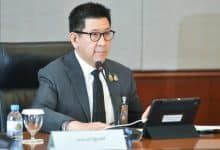Finance Minister, Central Bank Chief to discuss interest rates

A crucial meeting is scheduled tomorrow between Finance Minister Pichai Chunhavajira and Bank of Thailand Governor Sethaput Suthiwartnarueput to address the prevailing contention over interest rates.
The government, under Prime Minister Srettha Thavisin’s directive, has been advocating for a rate reduction to stimulate the economy. In contrast, the central bank has maintained its key rate at the highest in ten years, 2.50%, with the upcoming rate review set for June 12.
Pichai, who stepped into his role amid a Cabinet reshuffle last month, has sought to minimise the perceived rift. He has publicly stated that there are no plans to undermine the central bank’s autonomy or to replace its governor.
His intention behind the forthcoming discussion is to synchronise the country’s fiscal and monetary policies to support economic growth.
The Economic Society of Thailand, representing 300 economists, recently endorsed the central bank’s independence.
The society emphasised the importance of an autonomous monetary policy for ensuring economic stability and controlling inflation, cautioning against the politicisation of monetary policy for short-term gains.
This group has also organised a seminar scheduled for May 28, aimed at reinforcing Thailand’s economic framework in the medium to long term.
Amidst these events, rumours have circulated about potential amendments to the central bank law to alter its independence. Nonetheless, both PMr Srettha and Pichai have dismissed any intentions to pursue such changes.
Governor Sethaput has firmly stated that the central bank will not yield to political pressures in its decision-making process regarding interest rates.
He continues to argue that Thailand’s economic challenges are deeply structural, suggesting that mere fiscal stimulus is insufficient for substantial improvement, reported Bangkok Post.
In related news, Federation of Thai Industries Vice Chairman Montri Mahaplerkpong voiced opposition to any proposals that would impede the Bank of Thailand‘s (BoT) authority over its financial stability management.
Montri argued that the government should explore more palatable solutions to its disagreement with the BoT over policy rates, rather than attempting to curtail its power, which he sees as a contentious approach.
Latest Thailand News
Follow The Thaiger on Google News:


























